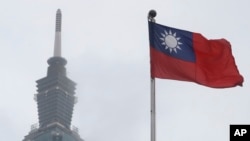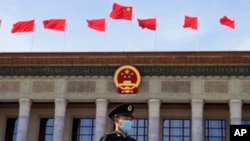Weeks before Taiwan’s January 13 presidential and legislative election, the three presidential candidates – Hou Yu-ih, Lai Ching-te, and Ko Wen-je – have increased efforts to sharpen rhetoric on cross-strait relations, an issue long dominating Taiwan’s politics.
With no major differences among their cross-Strait policy platforms, which endorse preserving the status quo across the Taiwan Strait, some analysts say the only way to differentiate themselves is to claim to be the only candidate able to restart cross-Strait dialogue.
Yen Wei-Ting, an expert on Taiwan politics at Franklin and Marshall College, told VOA by phone that Beijing’s attitude "is the decisive factor" in determining which candidate could promise to resume conversation with China.
China’s preference for dealing with the main opposition Kuomintang party, she said, allows that party to frame itself as the party that Beijing "is willing to talk to" while putting the ruling Democratic Progressive Party at a disadvantage.
The three candidates attended the first televised policy debate Wednesday, doubling down on their cross-Strait policy platforms and taking jabs at each other’s stance on handling relations with Beijing.
They all promised to facilitate exchanges and cooperation with China and strengthen Taiwan’s self-defense capabilities.
Hou, from the Kuomintang, centered his arguments around framing the presidential election as a choice between war and peace.
He criticized the Democratic Progressive Party for pushing Taiwan closer to war and promised to increase goodwill between the two sides of the Taiwan Strait to ensure Taiwan can "truly steer away from conflicts and move toward peace."
Facing fierce criticism from Hou about a prior statement that Taiwan is already a sovereign state, Lai, Taiwan’s vice president and DPP presidential candidate, said Taiwan’s sovereignty cannot be violated and Taiwan cannot be annexed.
He emphasized the need for Taiwan to form closer partnerships with democracies around the world and further enhance deterrence while accusing his opponents of accepting the "One China Principle" upheld by Beijing, a position he said showed they could not defend Taiwan’s survival.
Presenting himself as an alternative to the cross-strait visions of the two mainstream political parties, Ko, from the Taiwan People’s Party, a smaller opposition party that has presented itself as an alternative to the DPP and Kuomintang, said cross-strait exchange could be achieved through mutual understanding, respect, and cooperation, adding that Taiwan's autonomy and cross-strait peace are the basis of his basic attitudes toward cross-strait relations.
The three, Yen told VOA "are trying to consolidate support from their voters through this rhetoric."
Candidates’ cross-strait rhetoric reflects the generational divide in Taiwan.
The candidates’ cross-strait rhetoric has drawn varied reactions from voters. While some older voters say Hou is the only candidate capable of preventing a war with China, younger voters are divided over cross-strait issues.
"Out of the three candidates, I think Hou can help stabilize the situation across the Taiwan Strait because I think it’s better to have dialogue with China than not having any interaction between the two sides," Hsu Hsiu-Han, a 58-year-old housewife, told VOA at a campaign rally in Taichung, Taiwan’s second-largest city.
Other voters say Taiwan needs to remain neutral between the United States and China because leaning too close to either side could anger the other side.
"We need to know when is the right time to keep a distance from China and when is the right time to have dialogue with them," Lin Hui-fen, a 60-year-old retiree, told VOA in Taichung, adding that Hou is the candidate who can best safeguard Taiwan’s interests and avoid taunting China.
While some older voters favor Hou’s approach to play down tension across the strait, younger voters remain divided over cross-strait issues. Some say safeguarding Taiwan’s sovereignty is the top priority for them and they think Lai is the only candidate who can prevent Taiwan from succumbing to China’s growing aggression.
Others say DPP efforts to amplify the narrative of "resist China to protect Taiwan" in recent years have become tiresome.
"I think all political parties’ efforts to double down on narratives related to China are simply to get media attention and attract more votes," Sophie Lin, a 30-year-old project manager, told VOA in Taipei.
"As it seems to be another election dominated by cross-strait issues, I don’t plan to come out and vote on January 13. These political theatrics have overshadowed the real issues troubling young people in Taiwan," she added.
Other young people think Taiwan’s politics have long been dominated by the two main political parties with no sign that persistent social and economic issues, such as low wages and unaffordable housing prices, are being adequately addressed. They say they want to support a party that prioritizes these issues that are of concern to young people in Taiwan.
"The DPP and KMT have long prioritized cross-strait issues for electoral gains and ignored important socioeconomic issues, causing Taiwan’s social development to remain stagnant," said Angus Hsiao, a 31-year-old engineer in Taipei. "I will vote for Ko Wen-je because I think he can usher in some real political change in Taiwan."
Yen said there is a limitation to the effect of candidates’ attempts to mobilize voters through cross-strait rhetoric.
"While some older voters might prefer KMT’s cross-strait discourse, younger voters are less likely to be mobilized by presidential candidates’ cross-strait positions in this election," she told VOA.
She said that since younger voters are in more agreement on issues of identity and Taiwan’s status as a sovereign state than older voters, when there are no fundamental differences in the presidential candidates’ cross-strait policy platforms, the younger voters would pay more attention to presidential candidates’ policy platforms on social and economic issues.
"This shows that while the China issue remains the most dominant factor in this election, there is a generational limitation to the effect of presidential candidates’ attempts to mobilize voters through relevant rhetoric," she said.





